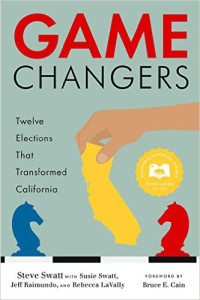Elections matter an old saying goes. Four seasoned California political observers set out to prove that maxim by examining 12 elections that moved California policy and politics in new directions. Game Changers, winner of the California Historical Society Book Award, was written by former television and print reporter Steve Swatt, veteran legislative staff member Susie Swatt, political and public relations consultant Jeff Raimundo, and former United Press International and Gannett News Service Sacramento Bureau chief Rebecca LaVally.
The book takes the reader on a ride through momentous campaigns in California history relating stories of colorful characters and policy debates that make up the Golden State’s rich tableau of political history. More importantly, the elections directly affect our present day political landscape.
There’s the tale of Hiram Johnson’s boost on the road to the governor’s chair because a fellow prosecutor was shot in a San Francisco courtroom. Johnson’s election as governor led to California voters adopting the initiative process with a 76% vote of the people, coincidentally, pretty much the same support Californians give the initiative process in modern day polls.
How did Democratic state Treasurer Jesse Unruh score the largest landslide in California voting history? With the help of Republican governor George Deukmejian.
Why did Secretary of State Jerry Brown write the game changing political reform act of 1974 as he did? To clean up politics, sure, but with an eye on a run for governor; he insisted on spending limits to allow him to be competitive with rivals for the higher office.
There are even echoes from yesteryear in many of the tales that seem quite up to date in our modern political environment.
Governor Leland Stanford’s election in 1861 led to the railroad that climbed over and through the Sierra Mountains. The legislature begged the federal government for financial help building the railroad. High speed rail, anyone?
The Workmen Association that led the charge for a new constitution in 1879 had plans on taxing millionaires. The level at which the higher tax rates kick in may have come down a few hundred thousand dollars over the century-plus but the idea is still alive in Proposition 30 and its proposed extensions.
What the authors call California’s dirtiest election engineered by pioneering political consultants Clem Whitaker and Leone Baxter focuses on Upton Sinclair run as a Socialist for governor in 1934, as Bernie Sanders mounts that same steed in his quest for the presidency today.
The bond election in 1905 that would bring water to Los Angeles gets a chapter, as does Earl Warren’s and Pat Brown’s monumental governorships, the battle over term limits and the Proposition 13 tax revolt. (Disclosure: I was interviewed for the latter chapter and my book was used as a cited reference in that chapter.)
The book is full of characters that a fiction writer would be envious of creating, tales of machinations and anecdotes that liven the storytelling. Extensive research and interviews with participants involved in the more modern elections enrich the telling.
Think lively and adventurous storytelling. It is not for history buffs alone but for those who want to understand how California politics and policy came to be.
You can read more and get the book here.


